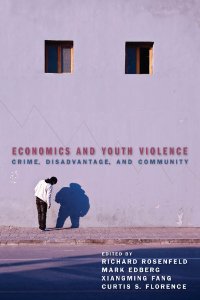Edited by Richard Rosenfeld, Mark Edberg, Xiangming Fang, and Curtis S. Florence
How do economic conditions such as poverty, unemployment, inflation, and economic growth impact youth violence? Economics and Youth Violence provides a much-needed new perspective on this crucial issue. Pinpointing the economic factors that are most important, the editors and contributors in this volume explore how different kinds of economic issues impact children, adolescents, and their families, schools, and communities. Offering new and important insights regarding the relationship between macroeconomic conditions and youth violence across a variety of times and places, chapters cover such issues as the effect of inflation on youth violence; new quantitative analysis of the connection between race, economic opportunity, and violence; and the cyclical nature of criminal backgrounds and economic disadvantage among families. Highlighting the complexities in the relationship between economic conditions, juvenile offenses, and the community and situational contexts in which their connections are forged, Economics and Youth Violence prompts important questions that will guide future research on the causes and prevention of youth violence. Contributors: Sarah Beth Barnett, Eric P. Baumer, Philippe Bourgois, Shawn Bushway, Philip J. Cook, Robert D. Crutchfield, Linda L. Dahlberg, Mark Edberg, Jeffrey Fagan, Xiangming Fang, Curtis S. Florence, Ekaterina Gorislavsky, Nancy G. Guerra, Karen Heimer, Janet L. Lauritsen, Jennifer L. Matjasko, James A. Mercy, Matthew Phillips, Richard Rosenfeld, Tim Wadsworth, Valerie West, Kevin T. Wolff Richard
New York: London: New York University Press, 2013. 341p.



